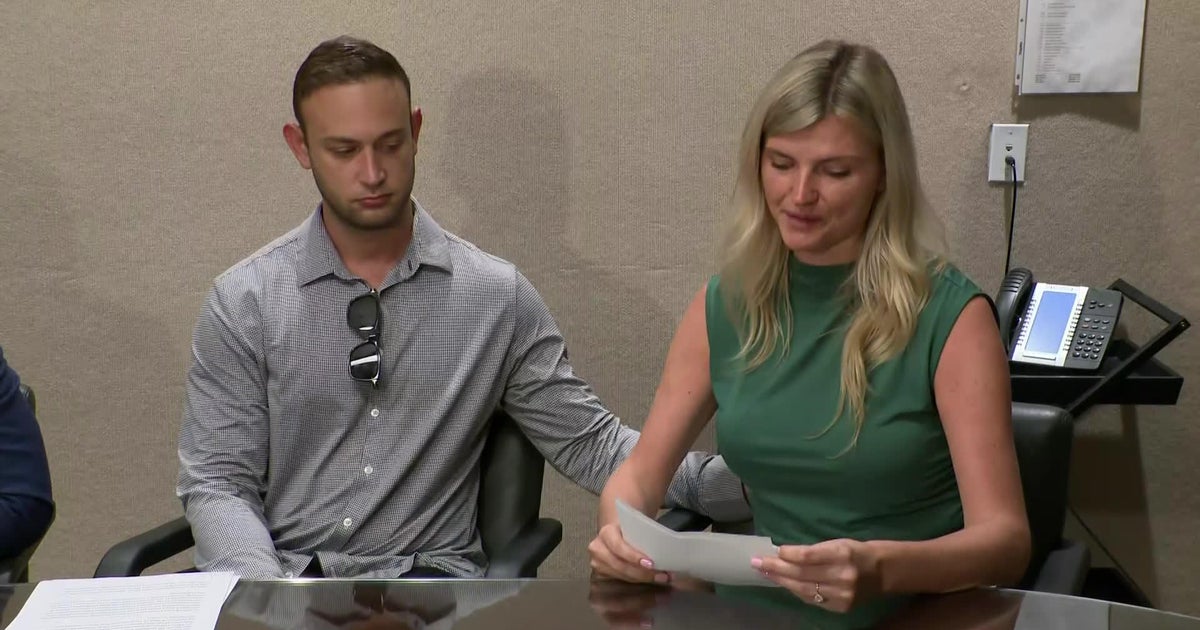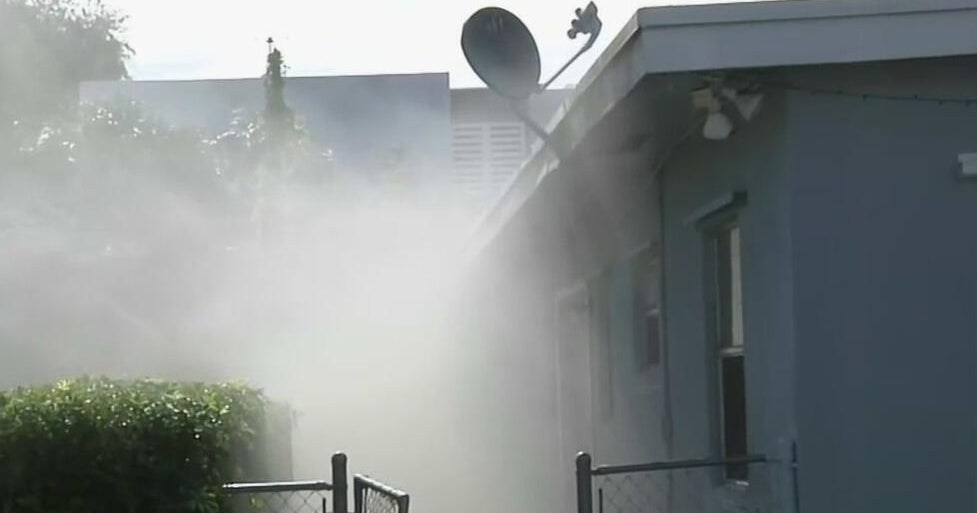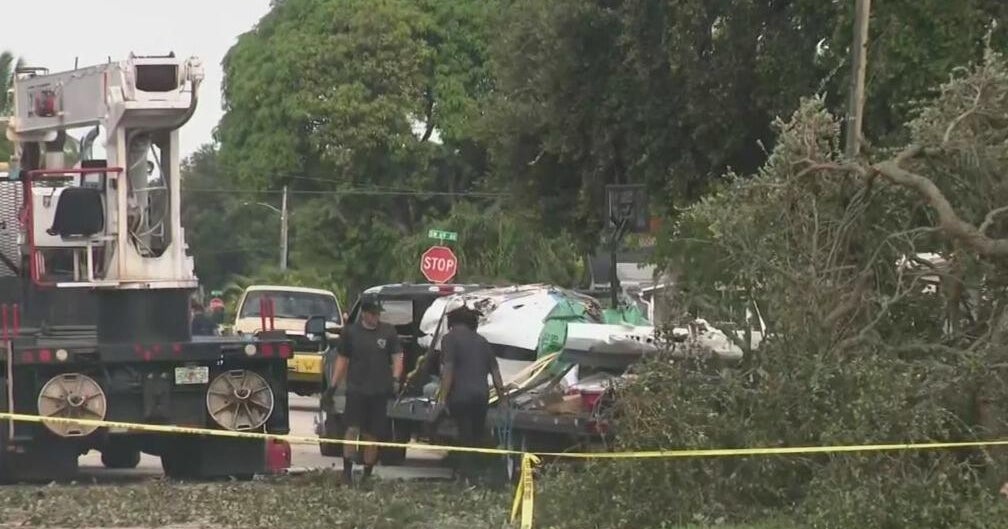TALLAHASSEE (CBSMiami/NSF) – A year after passing a sweeping law aimed at protests, state legislators are moving forward with a proposal that could criminalize demonstrations in front of or around people’s homes – including the governor’s mansion.
House and Senate panels on Tuesday approved similar measures that would make it illegal to “picket or protest before or about the residence or dwelling of any person with the intent to harass or disturb that person in his or her home.”
READ MORE: Police: Miami Lakes Father Kills Children Ages 12 & 9 Before Turning Gun On Self
The prohibition would apply not only to private property but would extend to public parks, sidewalks and rights-of-way.
Orange County Sheriff John Mina told the House Criminal Justice & Public Safety Subcommittee that the ban is needed to protect people and their families from being hassled near their abodes.
“Our most sacred location is our home, where we don’t want to be disturbed, harassed,” Mina said.
Elected officials are accustomed to people disagreeing with them in public places, the sheriff said, “but I think what us and our neighbors don’t wish to see is when we come home to that sacred home that we’re not intimidated or harassed at our home.”
Mina pointed to a group of about 200 protesters who staged protests for days outside a residence in Windermere owned by former Minneapolis police officer Derek Chauvin. The demonstrations took place before and after Chauvin was charged with murder in the death of George Floyd, a Black man who died after Chauvin knelt on his neck for more than eight minutes. Chauvin was later convicted of killing Floyd, whose death sparked nationwide protests over racial inequities in policing.
Mina said he had “no remedy” for residents in the neighborhood who complained about the protests.
“They couldn’t walk their dogs. They couldn’t let their kids ride their bikes. … Some people left their homes and stayed in hotel rooms, if they had the means to do that,” Mina said. “That’s how uncomfortable and intimidating and harassing the activity was.”
But Rep. Geraldine Thompson, a Democrat who lives in Windermere, said the bill does not include definitions of “harass” and “disturb.” She argued that the protests at Chauvin’s house were peaceful.
“They did march in front of the home. They wrote on the sidewalk in chalk, which could be washed away with water,” she said. “They did not disturb the home in any way.”
The House panel approved the proposal (HB 5157) in a 14-3 vote, shortly before the Senate Criminal Justice Committee signed off on a similar measure (SB 1664) in a 4-2 vote.
The proposal came after the Republican-controlled Legislature last year passed a measure (HB 1) championed by Gov. Ron DeSantis after the protests responding to Floyd’s death. The law enhanced penalties and created new crimes in protests that turn violent. Civil-rights groups quickly challenged the legislation in court..
Calling it unconstitutionally “vague and overbroad,” Chief U.S. District Judge Mark Walker in September blocked the law. DeSantis asked the 11th U.S. Circuit Court of Appeals to overturn the judge’s decision. The state’s appeal is pending.
Critics of the latest proposal are echoing arguments against last year’s bill, saying the 2022 measure could allow law enforcement officials to arrest peaceful protesters and lead to Black and Hispanic demonstrators being targeted by police.
READ MORE: North Lauderdale Apartment Fire, One Dead
“I believe that this bill is another attempt to further silence and criminalize those who want justice and accountability,” Gail Johnson, a former Gainesville city commissioner, told the Senate committee. Johnson, who is Black, spearheaded a separate lawsuit filed by cities challenging last year’s protest legislation.
Johnson warned of the “disparate impact this will absolutely have on Black and brown communities.”
But Senate Criminal Justice Chairman Jason Pizzo, D-North Miami Beach, pressed Johnson on the issue, asking “what’s the value” of protesting at an elected official’s residence.
“What’s the value of us being able to protest peacefully in the United States of America?” Johnson retorted.
American Civil Liberties Union of Florida lobbyist Neisha-Rose Hines told the committee that “there are already numerous criminal statutes that can address” demonstrations that get out of hand.
“We believe bills like these will end up like HB 1, being challenged by organizations like the ACLU of Florida, and it is a waste of taxpayers time and money,” Hines said.
But Senate bill sponsor Keith Perry, R-Gainesville, said he believes the legislation is constitutional.
“We didn’t want to limit anybody’s free speech at all,” Perry said. “We just wanted to say there are certain areas that would be off limits to that because it’s not redressing government. It’s clearly the intent to harass. Again, if you’re on a sidewalk and a kid gets off a school bus, and they have to walk through a bunch of protesters, picketers, at your home, and I would say not.”
The First Amendment Foundation and the ACLU of Florida said the bill would apply to demonstrations outside the governor’s mansion.
“This bill is so overly broad that, as written, law enforcement could arrest individuals peacefully protesting outside the governor’s mansion if the officer subjectively thought that a protester’s intent was to disturb the governor. Arrests should be based on unlawful conduct; this bill allows law enforcement to arrest based on their subjective belief as to someone’s intent even if their conduct is perfectly lawful and protected by the First Amendment,” ACLU of Florida legislative director Kara Gross said in an email Tuesday afternoon.
Sen. Jeff Brandes, R-St. Petersburg, and Sen. Annette Taddeo, D-Miami, voted against the bill in the Senate committee. Brandes said the bill is too vague.
“The right to assemble is one guaranteed by our Constitution, especially if you’re going to peacefully assemble within a public place, so I can’t support the bill. I understand the intent. I think the word dwelling is fine. … But the word ‘about’ is what I have concern with and the overly broad interpretation that that could be,” Brandes argued.
The House and Senate bills each need to clear one more committee before they could be considered for full floor votes.
MORE NEWS: 10 Big Issues As Florida Legislature Reaches 60-Day Session Halftime
(©2022 CBS Local Media. All rights reserved. This material may not be published, broadcast, rewritten, or redistributed. The News Service of Florida’s Dara Kam contributed to this report.)



